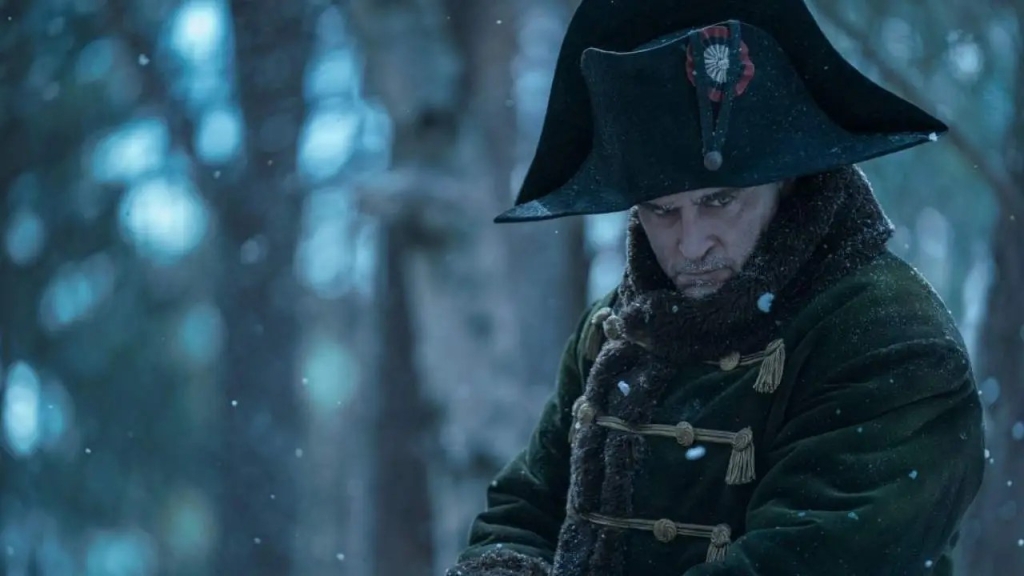Who was it that said history was just one damn thing after another? This is what Sir Ridley Scott‘s epic Napoleon (2023) feels like when not focused on the electrifying performance of Joaquin Phoenix, as the diminutive great man himself, and his passionate, playful, volatile relationship with his lover and wife (and ex-wife), Josephine — beautifully portrayed by an entirely miscast Vanessa Kirby.
For starters, Josephine was six years Bonaparte’s senior (Phoenix is 14 years older than Kirby), and while that bit of information, in itself, maybe would not mean much now, socially, it would be a significant hurdle in the period of history depicted, as well as in the troubles that led to the dissolution of the pair’s marriage — the inability of Josephine to conceive an heir to the throne, and salvage Napoleon’s lineage from oblivion (she already had children, from a previous marriage).
The psychological mechanics of the relationship, as well as the power games of the duo also would have been well informed by this particular nugget of age seniority of the Empress, as well as her calculating yet quite nourishing approach to handling the mesmerised, lustful advances of the love-sick Bonaparte. She was also a downtrodden sophisticated woman-of-the-world to the socially awkward victorious arriviste, and more of that dynamic would have meant a better grasp of Napoleon’s historically documented obsession.
Then again, the actor, himself, is perhaps too old for the role, yet is perfectly cast for it. He acts as if he were the younger person in the couple — and thus upholds the illusion.
In Phoenix, finally, there seems to have been a significant breakthrough in the portrayal of the military genius, in comparison to all the performances that preceded (the ones which I have seen). There is such a strategic ferocity behind the way he moves within a space, a kinetic immediacy, assessing all its weaknesses, finding ways to resolve the problem of conquering an area in an entirely mathematical way. His significant lack of consideration regarding the means necessary to achieve that end, yet an efficiency and expediency of his actions, all traits of someone at the pinnacle of military acumen. As are the reasons why he was truly admired by his troops, and even by enemy soldiers (see the aftermath of Waterloo).
The genuine warmth Phoenix brings to Bonaparte when in contact with his brothers-in-arms should be bottled and sold as some sort of battle elixir.
Equally, his overt disdain towards anyone lacking combat abilities is as palpable as anything, aimed most towards whom he perceives as undeserving examples of the aristocratic class.
What we gauge about Bonaparte from Scott’s Napoleon is that he was perhaps a man of extreme violence, but never someone that would downplay and undermine true merit. Even his ironic and mischievous approach to emperorship seems entirely plausible.
When we are presented with a close-up of Pheonix’s face while plotting an ingenious attack — we believe him, and this brings us nearer to an understanding who Napoleon was, at the core of things. There is nothing about the performance that is posturing and self-referential. It comes from a place of prolonged understanding, almost a haunting, an invocation of the doomed French Emperor, as if the spirit of the man had been resurrected by some form of cinematic magic for the purposes Napoleonic apologia.
Bonaparte is definitely not the anti-hero of this story so lavishly told.
However, other than the red-hot focus at the character of the central figure of Scott’s lengthy production, and his singular passions, all else in it is merely an opulent display in high cinematic skill (by frequent collaborator, cinematographer Dariusz Wolski) — but there is not much heart and soul put into the drama of it.
The battle scenes, although meticulously choreographed, seem too anecdotal and procedural i.e. one damn thing after another, all except two — Napoleon’s advance on Moscow, his shock at seeing the city in self-inflicted flames, and the part in the Battle of Austerlitz where an entire army seems to disappear into the ice. This is because these scenes had what the others of the ilk lacked — a depth of emotional involvement in warfare, one perfect shot telling us so much else we needed to know. A talent Scott masterfully displayed throughout Gladiator (2000).
Even if it was a strategic choice on Scott’s part — portraying a man’s day job (war) and messianic tendencies (empire) as only a backdrop to the personal, while spending all available dramatic energy on Bonaparte’s character and his desire for Josephine, it still backfired. Offering the public a spectacle, when in fact you are telling an intimate love story, sometimes does.
★★★✩✩
Author: ©Milana Vujkov

One response to “Napoleon”
One of the more cogent reviews I’ve read on the film; thanks!